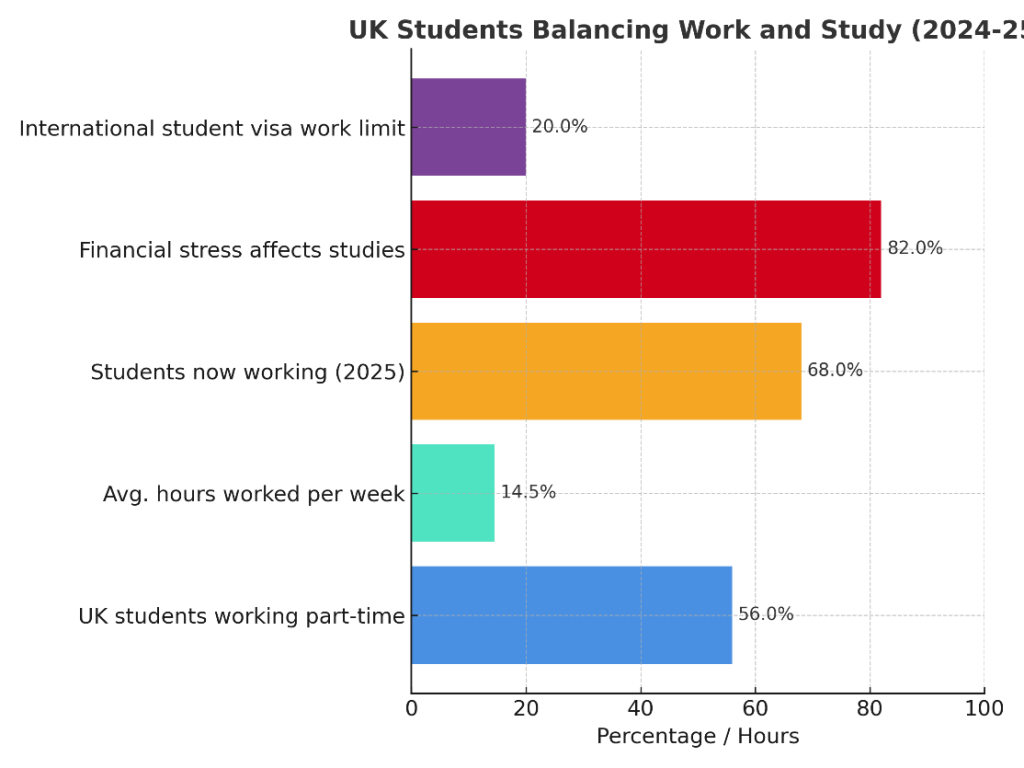15 Tips for UK Students to Balance Work and Study Life

Balancing work and studies altogether is no piece of cake. But not far-fetched. Many UK students take on part-time jobs to support themselves while pursuing their degrees.
It sounds simple on paper, but in reality, managing shifts, coursework, and personal life can feel like walking a tightrope. One late night at work, and ta-da! You have ended up with a rushed assignment the next day. Yet, countless students make it work, and so can you.
As the saying goes, “time is what we want most, but what we use worst.” Learning to manage your time well can be the difference between feeling constantly overwhelmed and actually enjoying student life.
So, how do you find that sweet spot where your studies don’t suffer and your job does not drain you? These 15 practical tips for UK students will show you how to keep balance, stay productive, and avoid burnout.
Finding The Balance In Work And Study Life
Working while studying is never about making extra money. It is more about building independence and gaining real-world experience. But without balance, it can quickly turn into exhaustion and missed opportunities.
Long hours at work can eat into study time, while last-minute assignments can make you dread your next shift. Over time, this stress can impact your grades, health, and even your motivation to continue.
Balance is not about doing everything perfectly. It is about setting priorities, knowing your limits, and using your time wisely. When you plan effectively, communicate clearly with employers, and stay organised, you will find room for both academic success and financial stability. It is not about working harder. It is about working smarter.
1. Set clear priorities
An American author, David Allen, said, You can do anything, but not everything.
University life is full of opportunities that bring classes, work, societies, friends, and personal projects. But trying to juggle all of them can leave you drained.
Decide what matters most at this stage. If your grades need improvement, consider reducing your work hours temporarily to focus on your studies. If your finances are tight, plan your study schedule around your shifts and seek help for assignment writing in London. Clarity keeps you from spreading yourself too thin.
2. Create a realistic schedule
Your planner or calendar is your most valuable resource. Write down lectures, deadlines, and work shifts so you can see where your time really goes. Many students underestimate the time it takes to complete tasks.
Factor in commuting, study breaks, and rest. Apps like Google Calendar or Notion can help you stay on track without feeling overwhelmed.
A good plan turns chaos into clarity.
3. Learn to say NO
FOMO is real, especially at university. But overloading yourself with social events or extra shifts can lead to burnout. Saying no does not make you boring. And even if it does, you know, rest is more important. Project your time so you can show up for the things that matter most.
4. Use small gaps wisely
Got an hour-long gap between lectures? Perfect for reviewing notes or finishing a reading.
Got to take a long bus ride to work? Catch up on a podcast related to your field.
Small actions done consistently can move mountains.
Instead of scrolling aimlessly, use those mini pockets of time to stay ahead.
5. Communicate with your employer
If you are working while studying, ensure to inform your employer about your academic commitments. Most managers appreciate students who are upfront about exam seasons or major deadlines. Ask if your schedule can be adjusted to accommodate extra study time when needed.
6. Take care of your health
Late nights, fast foods, and an overdose of caffeine might feel convenient in the moment. But they can drain your energy. Prioritise sleep, eat balanced meals, and stay active. Even a short walk can help clear your mind.
Your brain functions optimally when your body is in a good state. Without health, neither work nor study will feel manageable.
7. Build a support network
Surround yourself with people who understand your busy lifestyle. Classmates, flatmates, or coworkers who get it can make a huge difference. They will remind you to take breaks, share notes if you miss a lecture, or swap shifts when needed.
Pro tip: surround yourself with people who see you and hear your silence.
8. Stay organised with deadlines
Keep track of assignment dates and exam schedules. Utilise colour-coded calendars or digital apps to prevent last-minute panic.
Early action prevents stress and helps you keep both work and study running smoothly. As someone once said, Don’t put off until tomorrow what you can do today.
9. Don’t be afraid to ask for help
If you are struggling, talk to someone. A tutor, UK assignment help, or university support service. Many UK universities offer resources for students balancing work and studies, from financial advice to counselling. Asking for help does not mean you are weak. It reflects self-awareness.
10. Separate study and work spaces
If possible, avoid studying in places where you relax or working in places where you sleep. Even small boundaries, such as a specific desk or library spot, can help you stay focused. When you sit down to study, your brain should know it is time to work.
11. Limit distractions
Social media and constant notifications can eat up valuable hours. Consider apps like Forest or Focus@Will to stay on track. Set your phone aside while studying. Your future self will thank you. What you focus on grows.
12. Reward yourself
Celebrate small wins. Finishing a paper, surviving a long shift, or hitting a savings goal are worth celebrating. Treat yourself to a nice coffee, a walk, or a night in with friends. Motivation grows when you acknowledge progress. Hard work feels lighter when joy accompanies it along the way.
13. Keep your finances in check
One reason students work is to support themselves, but if your income is being drained by impulse spending, the struggle continues. Track your expenses and budget smartly. Apps like Monzo or Emma can help.
14. Stay flexible
Life as a student can take a complete 360-degree turn. New classes, new opportunities, unexpected challenges. Adapt when needed. Flexibility reflects your resilience. When things don’t go to plan, adjust and keep moving forward.
15. Remember your reasons
When you feel overwhelmed, remind yourself why you are doing both. Perhaps it is about achieving financial independence, gaining work experience, or building a better future. Purpose fuels perseverance. Keep your bigger goal in mind when things get tough.
Tools and resources to make life easier
Balancing work and studies does not mean you have to do everything on your own. The right tools can save you time, reduce stress, and keep you on track. Here are some student-friendly resources to help you manage your time more effectively.
Time management and organisation
- Google Calendar: syncs across devices and helps you map out classes, shifts, and deadlines.
- Notion: a flexible all-in-one workspace for notes, planning, and project tracking.
- Todoist: A simple task manager to create to-do lists and reminders.
Finance and budgeting
- Monzo: A UK-based digital bank with budgeting features and instant spending notifications.
- Emma: helps track subscriptions and manage daily spending.
- Yolt: A money management app that pulls all your accounts into one place.
Study support
- Quizlet: great for creating flashcards and conducting quick revision sessions.
- Grammarly: helps polish assignments by catching grammar mistakes and improving clarity.
- RefMe and CiteThisForMe: makes referencing sources easier and stress-free.
Wellbeing and mental health
- Student Minds UK: A mental health charity offering student-focused resources.
- Headspace: guided meditation and mindfulness to reduce stress.
- NHS Every Mind Matters: Practical self-care tips for managing stress and anxiety.
Do’s And Don’ts For Balancing Work And Study
Do’s
- Plan your week in advance using a calendar or planner.
- Clearly communicate your schedule to your employer.
- Take short breaks to recharge your mind and body.
- Use small time gaps, such as bus rides, for quick study or review.
- Make your health a top priority.
- Remind yourself why you are balancing both.
Don’ts
- Don’t take on more work hours than you can realistically handle.
- Don’t wait until the last minute to study or finish assignments.
- Don’t sacrifice sleep regularly for either work or study.
- Don’t be afraid to say NO when your plate is full.
- Don’t isolate yourself. Lean on friends, tutors, or support services.
- Don’t ignore stress or burnout. Deal with it before it piles up.
Facts And Figures About UK Students Working While Studying
- A survey by the Higher Education Policy Institute (HEPI) found that 56% of full-time UK students hold paid employment, averaging about 1.5 hours per week.
- In 2025, that number increased: 68% of full-time undergraduates now work during term time.
- For international students on a student Visa, UKCISA states that degree-level students may work up to 20 hours per week during term time.
- Many universities echo this. For example, the University of London (UCL) allows up to 20 hours of paid or unpaid work per week during term for degree students.
- The cost of living is tightening margins: 67% of students reported skipping meals at least sometimes in the Student Money Survey 2024.

Conclusion
Balancing work and study life as a UK student is not a walk in the park. But it is the lemons, and you should know how to make lemonade out of them. It is absolutely possible with the right approach. It is less about doing everything perfectly and more about finding what works for you.
Setting priorities, managing your time wisely, and taking care of your health can transform a hectic schedule into something manageable and even rewarding. Every late-night study session or early morning shift is building resilience, discipline, and skills that will serve you well beyond university.
As one saying goes, the struggle you are in today is developing the strength you need for tomorrow.